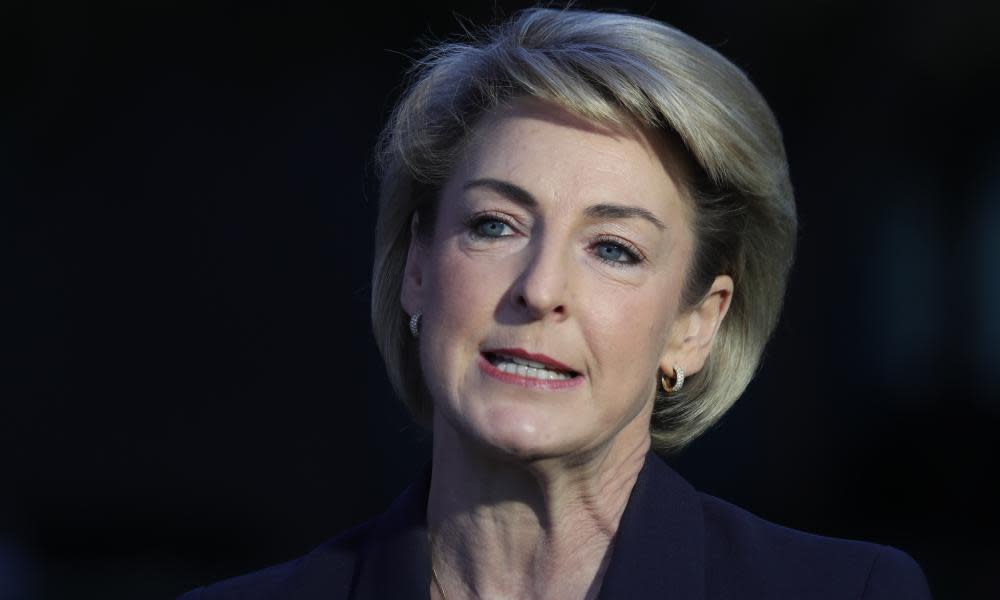Morrison government announces return to mutual obligation for jobseekers

The federal government has announced a “limited capacity” return to mutual obligation requirements for Australia’s welfare recipients from next week.
The employment minister, Michaelia Cash, announced mid-May that mutual obligations for jobseekers, which had been put on pause at the beginning of the coronavirus crisis, would be further suspended until 1 June, after which a three-phase reintroduction would commence.
After declining to put a timeframe on the restart of the system, which forces unemployed people receiving benefits to show proof of jobseeking efforts to continue receiving their payments, Cash, along with the social services minister, Anne Ruston, announced stage one, through a press release, on Sunday afternoon.
Related: All Centrelink debts raised using income averaging unlawful, Christian Porter concedes
“Mutual obligation requirements remain suspended until Monday 8 June 2020 to ensure job seekers and employment service providers are given time to prepare for the new arrangements,” the release said.
“From Tuesday 9 June 2020, job seekers will be required to undertake at least one appointment with their employment services provider, which can be done online or over the phone. During the initial period following the reintroduction of mutual obligations, suspensions and financial penalties will not apply to job seekers who do not meet this requirement.
“The government strongly encourages job seekers to maintain contact with their employment services provider at this time to ensure they are aware of opportunities available for training, upskilling or employment.”
Exemptions can be applied for, for those judged to have “special circumstances”.
In an analysis, ANZ found Australian job ads fell by more than 50% over April as the official unemployment rate rose to 6.2%, after 600,000 Australians reported losing their jobs as the nation was locked down.
Unofficially, the unemployment rate is thought to be much closer to 10% after almost 500,000 Australians dropped out of the labour force figures – meaning they stopped looking for work altogether.
As the federal government pushes to reopen the nation, and turns its focus to the economy in the face of a global depression, the stimulus measures, including a Covid-19 supplement used to double the unemployment payment, and the jobkeeper wage subsidy, are increasingly under the microscope.
Both are due to end in late September, although pressure is mounting to increase the jobseeker unemployment rate permanently, above the $40-a-day Newstart rate.
So far the government has not shifted. But the prime minister, Scott Morrison, did mention a return to mutual obligations as part of his National Press Club address on resetting the economy last week.
“We must always ensure that there is the opportunity in Australia for those who have a go, to get a go,” he said. “This is our Australian way.
“Access to essential services, incentive for effort, respect for the principles of mutual obligation. Ensuring equal opportunities for those in rural and regional communities to be the same as those in our cities and our suburbs.
“All translated into policies that seek not to punish those who have success, but devise ways for others to achieve it.”
Business groups had welcomed the suspension of mutual obligations during the pandemic lockdown, as it meant their members would not have to deal with countless job applications for positions which either did not exist, or which applicants did not meet the requirements for.
No further detail was given on when the next two stages of the mutual obligation requirement return. Phase two includes applying for work while in phase three, penalties – the suspension of payments – will recommence.
Labor has not yet finalised its position on what it believes the jobseeker payment should be beyond September other than it wants a higher rate than the previous Newstart payment offered.
The Labor leader, Anthony Albanese, said he did not believe $40 a day was enough to live on but he also didn’t think the unemployment payment should stay at $550 a week.
“Now, I don’t think it should be kept at the level where it is, where jobseeker is higher than the age pension,” he said on 18 May. “That’s not a reasonable proposition. But it is the case, I think, that jobseeker shouldn’t go back down to $40 a day.”

 Yahoo News
Yahoo News 
